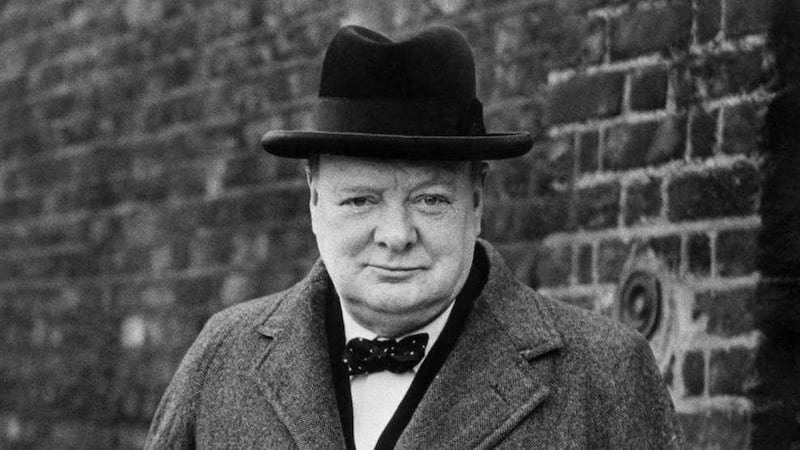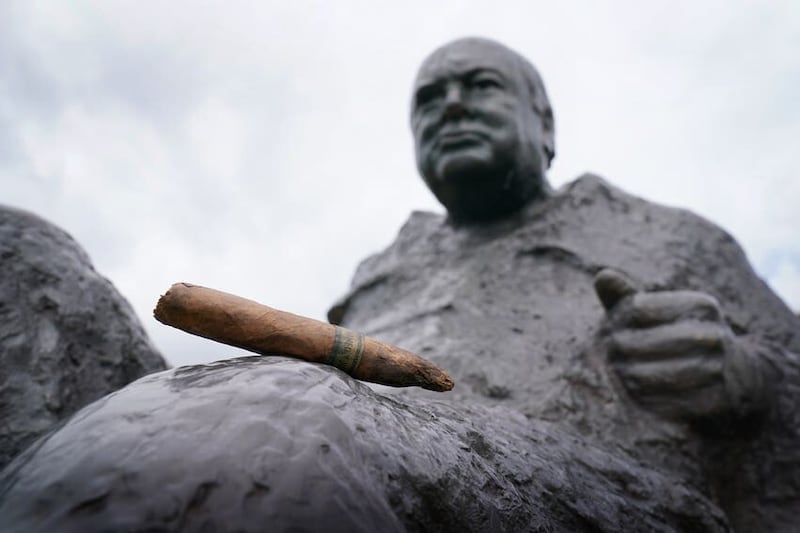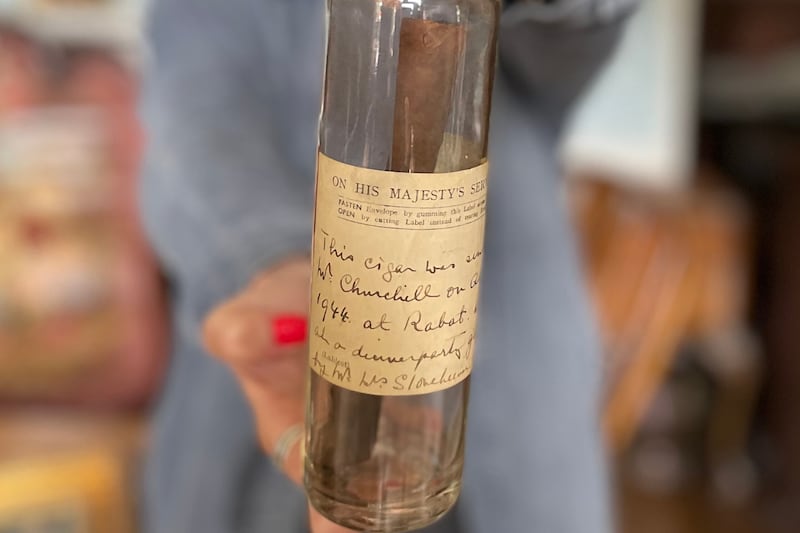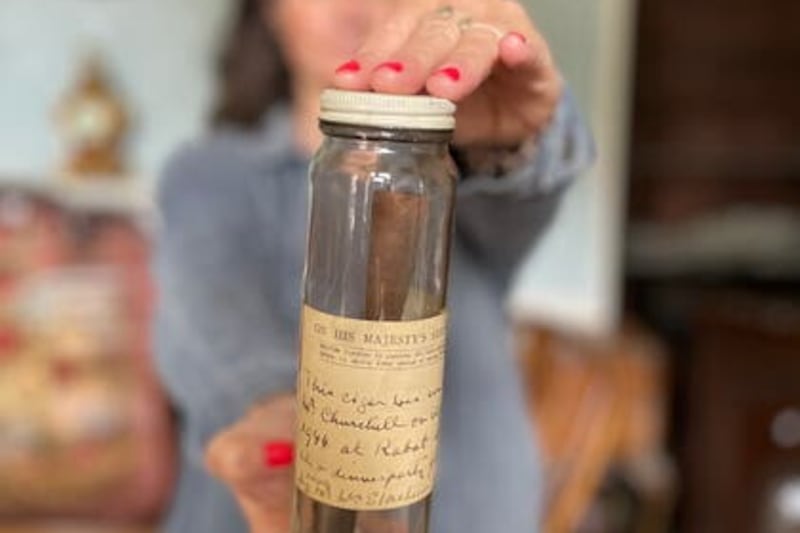BOOK OF THE WEEK
Churchill and Ireland by Paul Bew, published by Oxford University Press
IN A poll to decide who was the Greatest Briton, a few years ago, Winston Churchill was unsurprisingly named the winner. His role in 'Britain's Finest Hour' in 1940, perhaps the most important historical event in British popular memory, made this a certainty.
In Ireland, however, the view of Churchill of those of a nationalist disposition is often hostile. The charge sheet of his ‘crimes’ against Ireland are long. He was the son of Randolph, the man who played the ‘Orange Card’. He supported coercion during the 1919-21 Troubles. He was a leading figure in the Treaty which partitioned Ireland and led to a bitter civil war in the south.
He showed no respect for Irish neutrality (and by implication independence) in a broadcast in May 1945, which Eamon de Valera defiantly rebuked in a famous reply.
Oddly, the story of Churchill and Ireland has been neglected in comparison to the extraordinary number of books written about him. Paul Bew attempts to redress this neglect in his scholarly, readable and enjoyable book, which covers the whole gamut of Churchill’s involvement in Ireland from the toddler in the viceregal lodge in the Phoenix park to the the 1950s.
While no hatchet job, which is increasingly fashionable in works on Churchill, it is no whitewash. Churchill is frequently shown to be foolish and wise, impetuous and cautious (sometimes all at the same time) over issues like home rule, the Irish Troubles, Irish independence, Irish unity and Irish neutrality.
Bew certainly provides evidence that Churchill’s shifts on Irish matters from implacable unionist to home ruler to advocate of coercion then conciliation of Sinn Fein strongly relate to what he thought was best for his political career as he went from Conservative to Liberal and back again.
He makes the important point that Churchill, probably inadvertently, strengthened partition when, as chancellor of the exchequer, he guaranteed the finances of Northern Ireland in the late 1920s, though his views of Ulster unionism were frequently conflicted.
Churchill, he concludes, desired conciliation between Britain and Ireland and between Irish nationalism and unionism, which remains, at best, a work in progress. As a study of a political chameleon and Ireland, this book can be highly recommended.
Robert McNamara
:: Robert McNamara teaches History at the University of Ulster
The Dirty Dust: Cré na Cille by Máirtín Ó Cadhain, translated from the Irish by Alan Titley; Graveyard Clay: Cré na Cille by Máirtín Ó Cadhain, translated by Liam Mac an Iomaire and Tim Robinson, both published by Yale University Press
I WAS tempted to start this review with Alan Titley’s The Dirty Dust in the red corner and Liam Mac an Iomaire and Tim Robinson’s Graveyard Clay in the blue corner but it turns out that the two newly published translations of Máirtín Ó Cadhain’s Irish-language masterpiece Cré na Cille are not in mortal combat but actually combine to enhance or emphasize the qualities of each other.
Yale University Press scoured the globe for hidden gems of world literature and one that kept coming up was Ó Cadhain’s subterranean masterpiece, a novel written completely in dialogue and in which all the characters are dead and buried.
And yet it says a lot about the Irish language that we can mine two very different versions from the one source.
Alan Titley has the novelist's love of words and his Dirty Dust is a helter-skelter ride through the pettiness and jealousies of flawed but deeply human characters in 1940s rural Ireland. Just like the people above ground.
Biographer Mac an Iomaire's translation is perhaps more faithful to the original, the Conamara-man naturally at home in Ó Cadhain's dialect and milieu but both wonderfully capture the surrealism and claustrophobia and jet-black humour of the original.
Robert McMillen
When She Was Bad by Tammy Cohen, published in paperback by Black Swan
HOW well do you know your colleagues? You may have forged good friendships in the workplace, but this psychological thriller from Tammy Cohen will have you questioning everyone you know.
When She Was Bad takes place in Britain and America. It is told from the perspectives of the main characters and initially it's hard to tell how the two storylines will come together. The UK side focuses on life in a recruitment agency, while the US side describes an investigation into a 'House of Horror'.
Initially the House of Horror part draws you in, while the UK side takes a while to gather pace, but once it does, the book is difficult to put down. Tammy Cohen will keep you guessing to the end, and just when you think you've worked out what is going on, you'll change your mind again.
Rachael Dunn
Hitman Anders And The Meaning Of It All by Jonas Jonasson, published by Fourth Estate
TAKE a disillusioned hotel receptionist, an embittered former priest and a recently released hitman and what do you get? Yet another madcap tale from one of Sweden's most popular literary exports.
Per Persson has a relatively uneventful life as a hotel receptionist and he plans to keep it that way when the notorious Hitman Anders comes to stay. However, lapsed priest Johanna Kjellander has other ideas, spotting a gap in the market for hitman services for hire.
It all goes swimmingly until Hitman Anders turns his back on violence. But, never ones to miss out on a corporate opportunity, Johanna and Per embark on a new money-making scheme, with Anders unwittingly at the helm. Although irreverent and fun, unfortunately the plot does become a bit long-winded and the novel suffers as a result.
Jade Craddock
Not Working by Lisa Owens, published in hardback by Picador
IN LONDON-Irish writer Lisa Owens's debut novel Not Working, we enter the world of Claire Flannery. Claire is a dreamer. She has plans to read Ulysses and Moby Dick. Claire dreams of all the things she would do if she had all the time in the world. Then Claire quits her job.
Instead of finding a life-defining career, her life starts to take a downward spiral, as she picks spats with all those close to her, especially boyfriend Luke, and a fall-out with her mother mars her searching strategies.
However, after a short spell of temping, things start to look up for the jobseeker. The story flits from idea to opportunity to disappointment and back again, never really reaching a conclusion. Owens has managed to capture the malaise of the millennial generation, and ponders, who are we without a job title to define us in society?
Rachel Howdle







